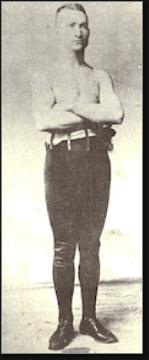
Sport: Boxing
Born: March 17, 1868
Died: September 13, 1938
Town: Harrison, New Jersey
Patrick McGuigan was born March 17, 1868 in Kentucky and grew up in Newark and surrounding towns, finally settling in Harrison, NJ. Though undersized, he was tough and quick with his hands. By his teen years, “Paddy” was winning bare-knuckle bouts against older, more experienced fighters. Because prizefighting was illegal in New Jersey, many of his matches took place on barges or in barns on private property. In his late teens, Paddy—who stood 5’7″ and fought at around 120 pounds— joined a traveling boxing troupe run by William Muldoon, a champion wrestler and boxing trainer, and Tom O’Rourke, a champion rower and also a trainer of fighters. Paddy was one of several boxers who would take on all comers at the athletic carnival’s various stops.
By the age of 20, Paddy had quit the troupe and returned home. One of O’Rourke’s fighters, George Dixon, became the first black world champion when he won the Bantamweight belt. Champions in that era often went touring, fighting the local hot-shot and drawing big gates. O’Rourke made the mistake of bringing Dixon to a theater in Newark. Paddy showed up and was beating the daylights out of the champion when O’Rourke dropped the curtain and ended the fight. Three years later, in 1891, Dixon won the Featherweight championship—and ducked Paddy as a challenger.
Jack McAuliffe, the reigning Lightweight champion, agreed to meet Paddy in Newark on two consecutive nights—guaranteeing two big gates. The first night, Paddy knocked McAuliffe all over the ring. The second night, McAuliffe refused to face him. By this time, Paddy was the Lightweight champion of New Jersey. He became the Interstate champ after beating Jack Aikens, the New York title holder, in the winter of 1892. The following spring, Paddy faced Joe Walcott, one of the era’s most savage welterweights. Though outweighed by 15 pounds, Paddy held his own until a Wolcott punch broke two of his ribs in the 7th round. He went the distance, but Walcott was awarded the 10-round decision. Even with the loss, Paddy further burnished his reputation as the man you just didn’t want to face in the ring.
One year later, Paddy was badly injured in a trolley car accident in Brooklyn. He did not fight again until 1896, and mostly fought exhibitions until he left the ring in 1900. Paddy also did some stage acting and performed pretend bouts with his friend Johnny Banks, a black middleweight, in area burlesque houses. Paddy stepped into the square circle twice more. In 1906, he defeated the famed strongman Charlie Sieger (aka “The Hoboken Ironman”) and lost in 1906 to Joe Fielding.
Paddy got into fight promotion in his 40s, and actually staged bouts under his home in Harrison until boxing was legalized in New Jersey in 1918. He was the first person in the state to obtain a license to stage matches and promptly opened the McGuigan Harrison Athletic Club and operated a saloon in the adjacent space (though Paddy himself neither drank nor smoked).
The club hosted regular fights and was known locally as “McGuigan’s Bucket of Blood.” In his 50s and 60s, Paddy was in good enough shape to spar with young boxers at the club. Among the big names who went through the Bucket of Blood were New Jersey legends Mickey Walker, Tony Galento and Abie Bain. Pete Gagliardi (aka Bobby Gleason), who later opened Gleason’s Gym in New York, made his pro debut at Paddy’s club. Often, the winner of a bout would use his prize money to buy drinks for the house next door.
One of Paddy’s sons, Harry, became the Navy’s Atlantic Fleet Welterweight champion. Two other McGuigan boys joined the Harrison police force. Paddy leveraged his fame and influence into important political connections and was a friend of Franklin Roosevelt’s. Paddy died at home in Harrison at the age of 70.